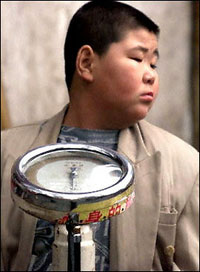|
One-child policy grows bigger children
(AFP)
Updated: 2005-10-20 09:23
VANCOUVER, Canada - China's one-child population control policy
contributes to rising child obesity, according to new research presented at an
international conference in Canada.

A boy stands in
front of a weighing machine at a shopping mall. China's one-child
population control policy contributes to rising child obesity, according
to new research presented at an international conference in Canada.
[AFP] | Sole children in Chinese families consumed
significantly more fat in their diets than in households with two or more
children, said Shu Wen Ng, a US public-policy researcher at Chapel Hill, North
Carolina.
About eight percent of children in China are obese. While still far below the
United States, where 31 percent of children are overweight or at-risk, the
percentage in China has doubled in 10 years.
Ng and colleague Barry Popkin used data from China Health and Nutrition
Surveys beginning in 1991. The research was presented this week to scientists
and doctors at NAASO, the Obesity Society, meeting in Vancouver, in western
Canada.
Sole children consumed 1.2 to 1.3 more percentage points of fat compared with
children in multi-child houses. Ng said the difference was greater in urban than
rural areas, but no difference between single-child girls or boys.
At the same time, she said, consumption of animal foods had risen between
1991 and 2000, while children are eating less fruits and vegetables.
"If you're an obese or overweight child, you're likely to become an obese or
overweight adult," said Ng. "Unless there is intervention to make people more
aware, and make changes in lifestyle, this is going to have an impact on their
future activity and economic contribution.
"In the big picture, this might even impact on China's development," added Ng
in an interview Tuesday. "Health care costs will go up, and because a fair
amount of health insurance in China is still public, government is going to take
some of the hit."
Ng said part of the change is economic, with rising incomes allowing people
to afford more food, while part may be cultural changes caused by families
having just one child.
"There is a growing concern that parents focus a lot on that one child, and
there are a lot of potential mental and health problems that might emerge," she
said. "When you are a single child, your parents are more likely to cave in to
what you want."
Ng, who grew up in Singapore and is doing doctoral research in the United
States, said the problem is more significant for urban children, who walk less
and have greater access to motorized transport.
But she noted changes throughout China. "There is a generational divide on
the outlook on food. Most parents and grandparents look on food as a matter of
survival. For children today, food is more of a status symbol, to tell your
classmate, 'Oh, have you tried this new type of food, or new brand?'"
Ng also noted other studies show "single children in Chinese families can
influence as much as 70 percent of the spending decisions by their parents,
compared to 40 per cent in the United States. There's a shift from parents being
(in control) to children with more of an influence."
|